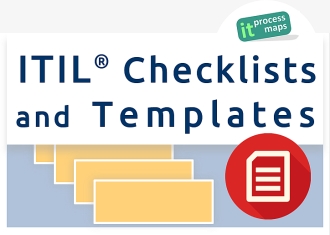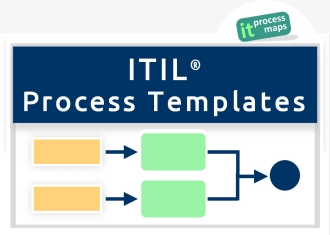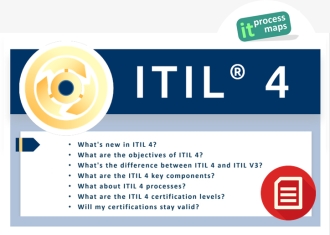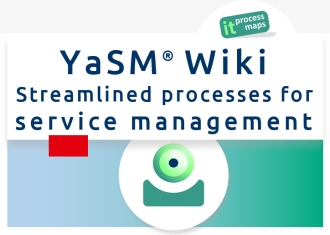ITIL Glossary/ ITIL Terms I: Difference between revisions
Created page with "<seo metakeywords="ITIL glossary definitions acronyms meanings terms words itsm it-service-management I" metadescription="Use this ITIL Glossary to look up the definitions of ..." |
mNo edit summary |
||
| Line 1: | Line 1: | ||
< | <itpmch><title>ITIL Glossary/ ITIL Terms I | IT Process Wiki</title> | ||
<meta name="keywords" content="ITIL glossary definitions acronyms meanings terms words itsm it-service-management I" /> | |||
<meta name="description" content="Use this ITIL Glossary to look up the definitions of ITIL terms starting with the letter I: Improvement Initiative, Incident, Incident Categorization, ..., IT Steering Group (ISG)." /> | |||
</itpmch> | |||
__NOTOC__ | __NOTOC__ | ||
| Line 13: | Line 16: | ||
|} | |} | ||
The ITIL | The ITIL glossary provides you with definitions for the most important glossary terms and acronyms on the '''IT Infrastructure Library ITIL®''' (ITIL 2011, ITIL V3 & V2) and IT Service Management (ITSM) in alphabetical order.[[ITIL Glossary/_ITIL_Terms_I#ITIL|['''1''']]] | ||
[[ITIL Glossary#All ITIL Terms|Look up all terms]] or browse alphabetically: | [[ITIL Glossary#All ITIL Terms|Look up all terms]] or browse alphabetically: | ||
| Line 29: | Line 32: | ||
<p><span id="top"> </span></p> | <p><span id="top"> </span></p> | ||
==ITIL Terms starting with <big>I</big>== | ===ITIL Terms starting with <big>I</big>=== | ||
---- | |||
For quick access, all ITIL terms and definitions starting with "I" are listed below. | For quick access, all ITIL terms and definitions starting with "I" are listed below. | ||
| Line 37: | Line 41: | ||
<p> </p> | <p> </p> | ||
* [[#Improvement Initiative|Improvement Initiative]] | *[[#Improvement Initiative|Improvement Initiative]] | ||
* [[#Incident|Incident]] | *[[#Incident|Incident]] | ||
* [[#Incident Categorization|Incident Categorization]] | *[[#Incident Categorization|Incident Categorization]] | ||
* [[#Incident Closure|Incident Closure]] | *[[#Incident Closure|Incident Closure]] | ||
* [[#Incident Escalation Rules|Incident Escalation Rules]] | *[[#Incident Escalation Rules|Incident Escalation Rules]] | ||
* [[#Incident Management|Incident Management]] | *[[#Incident Management|Incident Management]] | ||
* [[#Incident Management Report|Incident Management Report]] | *[[#Incident Management Report|Incident Management Report]] | ||
* [[#Incident Manager|Incident Manager]] | *[[#Incident Manager|Incident Manager]] | ||
* [[#Incident Model|Incident Model]] | *[[#Incident Model|Incident Model]] | ||
* [[#Incident Monitoring|Incident Monitoring]] | *[[#Incident Monitoring|Incident Monitoring]] | ||
* [[#Incident Prioritization Guideline|Incident Prioritization Guideline]] | *[[#Incident Prioritization Guideline|Incident Prioritization Guideline]] | ||
* [[#Incident Record|Incident Record]] | *[[#Incident Record|Incident Record]] | ||
* [[#Incident Report|Incident Report]] | *[[#Incident Report|Incident Report]] | ||
* [[#Incident Resolution|Incident Resolution]] | *[[#Incident Resolution|Incident Resolution]] | ||
* [[#Incident Status Information|Incident Status Information]] | *[[#Incident Status Information|Incident Status Information]] | ||
* [[#Index of Disaster-Relevant Information|Index of Disaster-Relevant Information]] | *[[#Index of Disaster-Relevant Information|Index of Disaster-Relevant Information]] | ||
* [[#Indirect Cost Allocation Table|Indirect Cost Allocation Table]] | *[[#Indirect Cost Allocation Table|Indirect Cost Allocation Table]] | ||
* [[#Information Security Management|Information Security Management]] | *[[#Information Security Management|Information Security Management]] | ||
* [[#Information Security Manager|Information Security Manager]] | *[[#Information Security Manager|Information Security Manager]] | ||
* [[#Information Security Policy|Information Security Policy]] | *[[#Information Security Policy|Information Security Policy]] | ||
* [[#Information Security Report|Information Security Report]] | *[[#Information Security Report|Information Security Report]] | ||
* [[#Installation Work Order|Installation Work Order]] | *[[#Installation Work Order|Installation Work Order]] | ||
* [[#Invoice|Invoice]] | *[[#Invoice|Invoice]] | ||
* [[#IT Budget|IT Budget]] | *[[#IT Budget|IT Budget]] | ||
* [[#ITC Infrastructure Manager|ITC Infrastructure Manager]] | *[[#ITC Infrastructure Manager|ITC Infrastructure Manager]] | ||
* [[#IT Facilities Management|IT Facilities Management]] | *[[#IT Facilities Management|IT Facilities Management]] | ||
* [[#IT Operations Control|IT Operations Control]] | *[[#IT Operations Control|IT Operations Control]] | ||
* [[#IT Operations Management|IT Operations Management]] | *[[#IT Operations Management|IT Operations Management]] | ||
* [[#IT Operations Manager|IT Operations Manager]] | *[[#IT Operations Manager|IT Operations Manager]] | ||
* [[#IT Operator|IT Operator]] | *[[#IT Operator|IT Operator]] | ||
* [[#ITSCM|ITSCM]] | *[[#ITSCM|ITSCM]] | ||
* [[#ITSCM Review|ITSCM Review]] | *[[#ITSCM Review|ITSCM Review]] | ||
* [[#ITSCM Risk Analysis|ITSCM Risk Analysis]] | *[[#ITSCM Risk Analysis|ITSCM Risk Analysis]] | ||
* [[#ITSCM Test|ITSCM Test]] | *[[#ITSCM Test|ITSCM Test]] | ||
* [[#IT Service Continuity Management|IT Service Continuity Management]] | *[[#IT Service Continuity Management|IT Service Continuity Management]] | ||
* [[#IT Service Continuity Manager|IT Service Continuity Manager]] | *[[#IT Service Continuity Manager|IT Service Continuity Manager]] | ||
* [[#IT Service Continuity Plan|IT Service Continuity Plan]] | *[[#IT Service Continuity Plan|IT Service Continuity Plan]] | ||
* [[#IT Service Continuity Report|IT Service Continuity Report]] | *[[#IT Service Continuity Report|IT Service Continuity Report]] | ||
* [[#IT Service Continuity Plan|IT Service Continuity Plan]] | *[[#IT Service Continuity Plan|IT Service Continuity Plan]] | ||
* [[#IT Service Continuity Strategy|IT Service Continuity Strategy]] | *[[#IT Service Continuity Strategy|IT Service Continuity Strategy]] | ||
* [[#IT Service Management|IT Service Management]] | *[[#IT Service Management|IT Service Management]] | ||
* [[#IT Steering Group (ISG)|IT Steering Group (ISG)]] | *[[#IT Steering Group (ISG)|IT Steering Group (ISG)]] | ||
<p> </p> | <p> </p> | ||
| Line 85: | Line 89: | ||
====Improvement Initiative==== | ====Improvement Initiative==== | ||
* → ITIL processes, [[ITIL | *→ ITIL processes, [[ITIL CSI - Continual Service Improvement|ITIL Continual Service Improvement (CSI)]] > [[Definition of Improvement Initiatives|Definition of CSI Initiatives]] | ||
* → ITIL processes, [[ITIL | *→ ITIL processes, [[ITIL CSI - Continual Service Improvement|ITIL Continual Service Improvement (CSI)]] > [[CSI Monitoring|Monitoring of CSI Initiatives]] | ||
====Incident==== | ====Incident==== | ||
* An Incident is defined as an unplanned interruption or reduction in quality of an IT service (a Service Interruption). | *An Incident is defined as an unplanned interruption or reduction in quality of an IT service (a Service Interruption). | ||
* → ITIL processes, [[ITIL | *→ ITIL processes, [[ITIL Service Operation|ITIL Service Operation]] > [[Incident Management]] | ||
====Incident Categorization==== | ====Incident Categorization==== | ||
* → ITIL sub-prozess, [[Incident Management#Incident-Categorization|Incident Logging and Categorization]] | *→ ITIL sub-prozess, [[Incident Management#Incident-Categorization|Incident Logging and Categorization]] | ||
====Incident Closure==== | ====Incident Closure==== | ||
* → [[Checklist Closure of an Incident]] | *→ [[Checklist Closure of an Incident]] | ||
* → ITIL processes, [[ITIL | *→ ITIL processes, [[ITIL Service Operation|ITIL Service Operation]] > [[Incident Management]] | ||
====Incident Escalation Rules==== | ====Incident Escalation Rules==== | ||
* A set of rules defining a hierarchy for escalating Incidents, and triggers which lead to escalations. Triggers are usually based on Incident severity and resolution times. | *A set of rules defining a hierarchy for escalating Incidents, and triggers which lead to escalations. Triggers are usually based on Incident severity and resolution times. | ||
* → [[Checklist Incident Escalation]] | *→ [[Checklist Incident Escalation]] | ||
* → ITIL processes, [[ITIL | *→ ITIL processes, [[ITIL Service Operation|ITIL Service Operation]] > [[Incident Management]] | ||
====Incident Management==== | ====Incident Management==== | ||
* → ITIL processes, [[ITIL | *→ ITIL processes, [[ITIL Service Operation|ITIL Service Operation]] > [[Incident Management]] | ||
====Incident Management Report==== | ====Incident Management Report==== | ||
* A series of reports produced by the [[ITIL Roles#Incident Manager|Incident Manager]] for various target groups (IT Management, Service Level Management, other Service Management processes, or Incident Management itself). | *A series of reports produced by the [[ITIL Roles#Incident Manager|Incident Manager]] for various target groups (IT Management, Service Level Management, other Service Management processes, or Incident Management itself). | ||
* Depending on the target group, the Report will focus upon process quality, volume of enquiries, service quality, itemization of Incidents by category, ... | *Depending on the target group, the Report will focus upon process quality, volume of enquiries, service quality, itemization of Incidents by category, ... | ||
* → ITIL processes, [[ITIL | *→ ITIL processes, [[ITIL Service Operation|ITIL Service Operation]] > [[Incident Management]] | ||
====Incident Manager==== | ====Incident Manager==== | ||
* → Roles within ITIL, [[ITIL Roles#Incident Manager|Incident Manager]] | *→ Roles within ITIL, [[ITIL Roles#Incident Manager|Incident Manager]] | ||
====Incident Model==== | ====Incident Model==== | ||
* An Incident Model contains the pre-defined steps that should be taken for dealing with a particular type of Incident. | *An Incident Model contains the pre-defined steps that should be taken for dealing with a particular type of Incident. | ||
* This is a way to ensure that routinely occurring Incidents are handled efficiently and effectively. | *This is a way to ensure that routinely occurring Incidents are handled efficiently and effectively. | ||
* → ITIL processes, [[ITIL | *→ ITIL processes, [[ITIL Service Operation|ITIL Service Operation]] > [[Incident Management]] | ||
====Incident Monitoring==== | ====Incident Monitoring==== | ||
* → ITIL sub-prozess, [[Incident Management#Incident-Monitoring|Incident Monitoring and Escalation]] | *→ ITIL sub-prozess, [[Incident Management#Incident-Monitoring|Incident Monitoring and Escalation]] | ||
====Incident Prioritization Guideline==== | ====Incident Prioritization Guideline==== | ||
* The Incident Prioritization Guideline describes the rules for assigning priorities to Incidents, including the definition of what constitutes a Major Incident. | *The Incident Prioritization Guideline describes the rules for assigning priorities to Incidents, including the definition of what constitutes a Major Incident. | ||
* Since Incident Management escalation rules are usually based on priorities, assigning the correct priority to an Incident is essential for triggering appropriate escalations. | *Since Incident Management escalation rules are usually based on priorities, assigning the correct priority to an Incident is essential for triggering appropriate escalations. | ||
* → [[Checklist Incident Priority|ITIL Checklist Incident Prioritization Guideline]] | *→ [[Checklist Incident Priority|ITIL Checklist Incident Prioritization Guideline]] | ||
* → ITIL processes, [[ITIL | *→ ITIL processes, [[ITIL Service Operation|ITIL Service Operation]] > [[Incident Management]] | ||
====Incident Record==== | ====Incident Record==== | ||
* A set of data with all details of an Incident, documenting the history of the Incident from registration to closure. | *A set of data with all details of an Incident, documenting the history of the Incident from registration to closure. | ||
* An Incident is defined as an unplanned interruption or reduction in quality of an IT service. | *An Incident is defined as an unplanned interruption or reduction in quality of an IT service. | ||
* Every event that could potentially impair an IT service in the future is also an Incident (e.g. the failure of one hard-drive of a set of mirrored drives). | *Every event that could potentially impair an IT service in the future is also an Incident (e.g. the failure of one hard-drive of a set of mirrored drives). | ||
* → [[Checklist Incident Record|ITIL Checklist Incident Record]] | *→ [[Checklist Incident Record|ITIL Checklist Incident Record]] | ||
* → ITIL processes, [[ITIL | *→ ITIL processes, [[ITIL Service Operation|ITIL Service Operation]] > [[Incident Management]] | ||
====Incident Report==== | ====Incident Report==== | ||
* → [[Checklist Incident Report]] | *→ [[Checklist Incident Report]] | ||
* → ITIL processes, [[ITIL | *→ ITIL processes, [[ITIL Service Operation|ITIL Service Operation]] > [[Incident Management]] | ||
====Incident Resolution==== | ====Incident Resolution==== | ||
* → ITIL sub-prozess, [[Incident Management#ITIL-Incident-Management-1st-Level|Immediate Incident Resolution by 1st Level Support]] | *→ ITIL sub-prozess, [[Incident Management#ITIL-Incident-Management-1st-Level|Immediate Incident Resolution by 1st Level Support]] | ||
====Incident Status Information==== | ====Incident Status Information==== | ||
* A message containing the present status of an Incident sent to a user who earlier reported a service interruption. | *A message containing the present status of an Incident sent to a user who earlier reported a service interruption. | ||
* Status information is typically provided to users at various points during an Incident's lifecycle. | *Status information is typically provided to users at various points during an Incident's lifecycle. | ||
* → ITIL processes, [[ITIL | *→ ITIL processes, [[ITIL Service Operation|ITIL Service Operation]] > [[Incident Management]] | ||
====Index of Disaster-Relevant Information==== | ====Index of Disaster-Relevant Information==== | ||
* A catalogue of all information that is relevant in the event of disasters. This document is maintained and circulated by [[IT Service Continuity Management]] to all members of IT staff with responsibilities for fighting disasters. | *A catalogue of all information that is relevant in the event of disasters. This document is maintained and circulated by [[IT Service Continuity Management]] to all members of IT staff with responsibilities for fighting disasters. | ||
* → ITIL processes, [[ITIL | *→ ITIL processes, [[ITIL Service Design|ITIL Service Design]] > [[IT Service Continuity Management]] | ||
====Indirect Cost Allocation Table==== | ====Indirect Cost Allocation Table==== | ||
* A table used to allocate indirect costs that are shared among multiple services, defining the rules how those costs are spread among the services. | *A table used to allocate indirect costs that are shared among multiple services, defining the rules how those costs are spread among the services. | ||
* → ITIL processes, [[ITIL | *→ ITIL processes, [[ITIL Service Strategy|ITIL Service Strategy]] > [[Financial Management]] | ||
====Information Security Management==== | ====Information Security Management==== | ||
* → ITIL processes, [[ITIL | *→ ITIL processes, [[ITIL Service Design|ITIL Service Design]] > [[IT Security Management|Information Security Management]] | ||
====Information Security Manager==== | ====Information Security Manager==== | ||
* → Roles within ITIL, [[ITIL Roles#Information Security Manager|Information Security Manager]] | *→ Roles within ITIL, [[ITIL Roles#Information Security Manager|Information Security Manager]] | ||
====Information Security Policy==== | ====Information Security Policy==== | ||
* The Information Security Management Policy describes and communicates the organization's approach to managing information security. | *The Information Security Management Policy describes and communicates the organization's approach to managing information security. | ||
* It includes references to more specific Underpinning Information Security Policies which, for example, set binding rules for the use of systems and information. | *It includes references to more specific Underpinning Information Security Policies which, for example, set binding rules for the use of systems and information. | ||
* → ITIL processes, [[ITIL | *→ ITIL processes, [[ITIL Service Design|ITIL Service Design]] > [[IT Security Management|Information Security Management]] | ||
====Information Security Report==== | ====Information Security Report==== | ||
* The Information Security Report provides other Service Management processes and IT Management with information related to Information Security issues. | *The Information Security Report provides other Service Management processes and IT Management with information related to Information Security issues. | ||
* → ITIL processes, [[ITIL | *→ ITIL processes, [[ITIL Service Design|ITIL Service Design]] > [[IT Security Management|Information Security Management]] | ||
====Installation Work Order==== | ====Installation Work Order==== | ||
* A Work Order for the installation of an application, system or infrastructure component, typically issued from [[Release and Deployment Management|Release Management]]. | *A Work Order for the installation of an application, system or infrastructure component, typically issued from [[Release and Deployment Management|Release Management]]. | ||
* → ITIL processes, [[ITIL | *→ ITIL processes, [[ITIL Service Transition|ITIL Service Transition]] > [[Release and Deployment Management]] | ||
====Invoice==== | ====Invoice==== | ||
* The invoice for the delivery of a service or product. | *The invoice for the delivery of a service or product. | ||
* → ITIL processes, [[ITIL | *→ ITIL processes, [[ITIL Service Strategy|ITIL Service Strategy]] > [[Financial Management]] | ||
====IT Budget==== | ====IT Budget==== | ||
* The IT Budget is an annual financial plan that provides a forecast of expected expenditures and allocates financial resources to the various [[ITIL Processes|service management processes]] and organizational units within the IT organization. | *The IT Budget is an annual financial plan that provides a forecast of expected expenditures and allocates financial resources to the various [[ITIL Processes|service management processes]] and organizational units within the IT organization. | ||
* → ITIL processes, [[ITIL | *→ ITIL processes, [[ITIL Service Strategy|ITIL Service Strategy]] > [[Financial Management]] | ||
====ITC Infrastructure Manager==== | ====ITC Infrastructure Manager==== | ||
* The ITC Infrastructure Manager is responsible for the provision and operation of certain infrastructure components. | *The ITC Infrastructure Manager is responsible for the provision and operation of certain infrastructure components. | ||
* He is mainly Service Provider for the IT Service Management processes, i.e. he ensures the frictionless operation of the Infrastructure and supports project activities pertaining to changes in the infrastructure. | *He is mainly Service Provider for the IT Service Management processes, i.e. he ensures the frictionless operation of the Infrastructure and supports project activities pertaining to changes in the infrastructure. | ||
* → Roles within ITIL V2: Roles outside of IT Service Management | *→ Roles within ITIL V2: Roles outside of IT Service Management | ||
====IT Facilities Management==== | ====IT Facilities Management==== | ||
* → ITIL processes, [[ITIL | *→ ITIL processes, [[ITIL Service Operation|ITIL Service Operation]] > [[IT Facilities Management|Facilities Management]] | ||
====IT Operations Control==== | ====IT Operations Control==== | ||
* → ITIL processes, [[ITIL | *→ ITIL processes, [[ITIL Service Operation|ITIL Service Operation]] > [[IT Operations Control]] | ||
====IT Operations Management==== | ====IT Operations Management==== | ||
* → ITIL processes, [[ITIL | *→ ITIL processes, [[ITIL Service Operation|ITIL Service Operation]], ITIL 2007 > [[IT Operations Management]] | ||
====IT Operations Manager==== | ====IT Operations Manager==== | ||
* → Roles within ITIL, [[ITIL Roles#IT Operations Manager|IT Operations Manager]] | *→ Roles within ITIL, [[ITIL Roles#IT Operations Manager|IT Operations Manager]] | ||
====IT Operator==== | ====IT Operator==== | ||
* → Roles within ITIL, [[ITIL Roles#IT Operator|IT Operator]] | *→ Roles within ITIL, [[ITIL Roles#IT Operator|IT Operator]] | ||
====ITSCM==== | ====ITSCM==== | ||
* → [[#IT Service Continuity Management|IT Service Continuity Management]] | *→ [[#IT Service Continuity Management|IT Service Continuity Management]] | ||
====ITSCM Review==== | ====ITSCM Review==== | ||
* → ITIL sub-prozess, [[IT Service Continuity Management#IT Service Continuity Review|ITSCM Review]] | *→ ITIL sub-prozess, [[IT Service Continuity Management#IT Service Continuity Review|ITSCM Review]] | ||
====ITSCM Risk Analysis==== | ====ITSCM Risk Analysis==== | ||
* → [[Checklist ITSCM Risk Analysis]] | *→ [[Checklist ITSCM Risk Analysis]] | ||
====ITSCM Test==== | ====ITSCM Test==== | ||
* → ITIL sub-prozess, [[IT Service Continuity Management#ITIL ITSCM Testing|ITSCM Training and Testing]] | *→ ITIL sub-prozess, [[IT Service Continuity Management#ITIL ITSCM Testing|ITSCM Training and Testing]] | ||
====IT Service Continuity Management==== | ====IT Service Continuity Management==== | ||
* → ITIL processes, [[ITIL | *→ ITIL processes, [[ITIL Service Design|ITIL Service Design]] > [[IT Service Continuity Management]] | ||
====IT Service Continuity Manager==== | ====IT Service Continuity Manager==== | ||
* → Roles within ITIL, [[ITIL Roles#IT Service Continuity Manager|IT Service Continuity Manager]] | *→ Roles within ITIL, [[ITIL Roles#IT Service Continuity Manager|IT Service Continuity Manager]] | ||
====IT Service Continuity Plan==== | ====IT Service Continuity Plan==== | ||
* A plan containing the steps required to recover one or more IT Services in the event of a desaster. | *A plan containing the steps required to recover one or more IT Services in the event of a desaster. | ||
* The plan also defines the basic conditions under which it applies, as well as communication mechanisms. | *The plan also defines the basic conditions under which it applies, as well as communication mechanisms. | ||
* The IT Service Continuity Plan should be part of a desaster plan for the whole business. | *The IT Service Continuity Plan should be part of a desaster plan for the whole business. | ||
* → ITIL processes, [[IT Service Continuity Management - ITIL V2]] | *→ ITIL processes, [[IT Service Continuity Management - ITIL V2]] | ||
====IT Service Continuity Report==== | ====IT Service Continuity Report==== | ||
* The IT Service Continuity Report is created at regular intervals and provides other Service Management processes and IT Management with information related to disaster prevention. | *The IT Service Continuity Report is created at regular intervals and provides other Service Management processes and IT Management with information related to disaster prevention. | ||
* → [[Checklist ITSCM Report]] | *→ [[Checklist ITSCM Report]] | ||
* → ITIL processes, [[ITIL | *→ ITIL processes, [[ITIL Service Design|ITIL Service Design]] > [[IT Service Continuity Management]] | ||
====IT Service Continuity Plan==== | ====IT Service Continuity Plan==== | ||
IT Service Continuity Plans underpin the ITSCM Strategy, describing how continuity is ensured for specific disaster events and services. | IT Service Continuity Plans underpin the ITSCM Strategy, describing how continuity is ensured for specific disaster events and services. | ||
* It specifies the measures to enhance the resilience of services and describes how to effectively respond to a disaster event. | *It specifies the measures to enhance the resilience of services and describes how to effectively respond to a disaster event. | ||
* ITSCM Plans usually include references to more detailed Recovery Plans with specific instructions for returning systems to a working state. | *ITSCM Plans usually include references to more detailed Recovery Plans with specific instructions for returning systems to a working state. | ||
* → [[Checklist IT Service Continuity Plan]] | *→ [[Checklist IT Service Continuity Plan]] | ||
* → ITIL processes, [[ITIL | *→ ITIL processes, [[ITIL Service Design|ITIL Service Design]] > [[IT Service Continuity Management]] | ||
====IT Service Continuity Strategy==== | ====IT Service Continuity Strategy==== | ||
* The IT Service Continuity Strategy contains an outline of the approach to ensure the continuity of vital services in the case of disaster events. | *The IT Service Continuity Strategy contains an outline of the approach to ensure the continuity of vital services in the case of disaster events. | ||
* It includes a list of Vital Business Functions and applied risk reduction or recovery options. | *It includes a list of Vital Business Functions and applied risk reduction or recovery options. | ||
* The IT Service Continuity Strategy should be based on a [[ITIL_Glossary/_ITIL_Terms_B#Business Continuity Strategy|Business Continuity Strategy]]. | *The IT Service Continuity Strategy should be based on a [[ITIL_Glossary/_ITIL_Terms_B#Business Continuity Strategy|Business Continuity Strategy]]. | ||
* The ITSCM Strategy is underpinned by more detailed ITSCM Plans, describing how continuity is ensured for specific disaster events and services. | *The ITSCM Strategy is underpinned by more detailed ITSCM Plans, describing how continuity is ensured for specific disaster events and services. | ||
* → ITIL processes, [[ITIL | *→ ITIL processes, [[ITIL Service Design|ITIL Service Design]] > [[IT Service Continuity Management]] | ||
====IT Service Management==== | ====IT Service Management==== | ||
* The processes within [[ITIL Processes|IT Service Management]] ensure that IT Services are provided in a focused, client-friendly and cost-optimised manner. | *The processes within [[ITIL Processes|IT Service Management]] ensure that IT Services are provided in a focused, client-friendly and cost-optimised manner. | ||
* With their help, IT Services are clearly defined, success can be measured with regards to the service provision, and targeted improvement measures can be introduced where necessary. | *With their help, IT Services are clearly defined, success can be measured with regards to the service provision, and targeted improvement measures can be introduced where necessary. | ||
* [[ITIL Processes|IT Service Management according to ITIL V3 2011 Edition]] (ITIL 2011) encompasses the following core disciplines: | *[[ITIL Processes|IT Service Management according to ITIL V3 2011 Edition]] (ITIL 2011) encompasses the following core disciplines: | ||
**[[ITIL | **[[ITIL Service Strategy|Service Strategy]] | ||
**[[ | **[[ITIL_Service Design|Service Design]] | ||
**[[ITIL | **[[ITIL Service Transition|Service Transition]] | ||
**[[ITIL | **[[ITIL Service Operation|Service Operation]] | ||
**[[ITIL | **[[ITIL CSI - Continual Service Improvement|CSI/ Continual Service Improvement]] | ||
====IT Steering Group (ISG)==== | ====IT Steering Group (ISG)==== | ||
* → Roles within ITIL, [[ITIL Roles#IT Steering Group (ISG)|IT Steering Group (ISG)]] | *→ Roles within ITIL, [[ITIL Roles#IT Steering Group (ISG)|IT Steering Group (ISG)]] | ||
<p> </p> | <p> </p> | ||
Revision as of 17:04, 2 August 2013
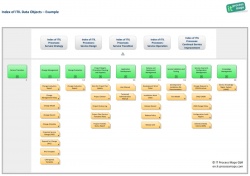
All terms related to ITIL (ITIL 2011, ITIL V3 & V2) and IT Service Management (ITSM)
| ITIL Glossary Terms |
The ITIL glossary provides you with definitions for the most important glossary terms and acronyms on the IT Infrastructure Library ITIL® (ITIL 2011, ITIL V3 & V2) and IT Service Management (ITSM) in alphabetical order.[1]
Look up all terms or browse alphabetically:
| 1 ... 9 |
| A | B | C | D | E | F | G | H | I | J | K | L | M | ||||||||||||
| N | O | P | Q | R | S | T | U | V | W | X | Y | Z |
ITIL Terms starting with I
For quick access, all ITIL terms and definitions starting with "I" are listed below.
Please click on one of the terms to see its definition or skip list and proceed to "Definitions".
- Improvement Initiative
- Incident
- Incident Categorization
- Incident Closure
- Incident Escalation Rules
- Incident Management
- Incident Management Report
- Incident Manager
- Incident Model
- Incident Monitoring
- Incident Prioritization Guideline
- Incident Record
- Incident Report
- Incident Resolution
- Incident Status Information
- Index of Disaster-Relevant Information
- Indirect Cost Allocation Table
- Information Security Management
- Information Security Manager
- Information Security Policy
- Information Security Report
- Installation Work Order
- Invoice
- IT Budget
- ITC Infrastructure Manager
- IT Facilities Management
- IT Operations Control
- IT Operations Management
- IT Operations Manager
- IT Operator
- ITSCM
- ITSCM Review
- ITSCM Risk Analysis
- ITSCM Test
- IT Service Continuity Management
- IT Service Continuity Manager
- IT Service Continuity Plan
- IT Service Continuity Report
- IT Service Continuity Plan
- IT Service Continuity Strategy
- IT Service Management
- IT Steering Group (ISG)
Definitions
Improvement Initiative
- → ITIL processes, ITIL Continual Service Improvement (CSI) > Definition of CSI Initiatives
- → ITIL processes, ITIL Continual Service Improvement (CSI) > Monitoring of CSI Initiatives
Incident
- An Incident is defined as an unplanned interruption or reduction in quality of an IT service (a Service Interruption).
- → ITIL processes, ITIL Service Operation > Incident Management
Incident Categorization
- → ITIL sub-prozess, Incident Logging and Categorization
Incident Closure
- → Checklist Closure of an Incident
- → ITIL processes, ITIL Service Operation > Incident Management
Incident Escalation Rules
- A set of rules defining a hierarchy for escalating Incidents, and triggers which lead to escalations. Triggers are usually based on Incident severity and resolution times.
- → Checklist Incident Escalation
- → ITIL processes, ITIL Service Operation > Incident Management
Incident Management
- → ITIL processes, ITIL Service Operation > Incident Management
Incident Management Report
- A series of reports produced by the Incident Manager for various target groups (IT Management, Service Level Management, other Service Management processes, or Incident Management itself).
- Depending on the target group, the Report will focus upon process quality, volume of enquiries, service quality, itemization of Incidents by category, ...
- → ITIL processes, ITIL Service Operation > Incident Management
Incident Manager
- → Roles within ITIL, Incident Manager
Incident Model
- An Incident Model contains the pre-defined steps that should be taken for dealing with a particular type of Incident.
- This is a way to ensure that routinely occurring Incidents are handled efficiently and effectively.
- → ITIL processes, ITIL Service Operation > Incident Management
Incident Monitoring
- → ITIL sub-prozess, Incident Monitoring and Escalation
Incident Prioritization Guideline
- The Incident Prioritization Guideline describes the rules for assigning priorities to Incidents, including the definition of what constitutes a Major Incident.
- Since Incident Management escalation rules are usually based on priorities, assigning the correct priority to an Incident is essential for triggering appropriate escalations.
- → ITIL Checklist Incident Prioritization Guideline
- → ITIL processes, ITIL Service Operation > Incident Management
Incident Record
- A set of data with all details of an Incident, documenting the history of the Incident from registration to closure.
- An Incident is defined as an unplanned interruption or reduction in quality of an IT service.
- Every event that could potentially impair an IT service in the future is also an Incident (e.g. the failure of one hard-drive of a set of mirrored drives).
- → ITIL Checklist Incident Record
- → ITIL processes, ITIL Service Operation > Incident Management
Incident Report
- → Checklist Incident Report
- → ITIL processes, ITIL Service Operation > Incident Management
Incident Resolution
- → ITIL sub-prozess, Immediate Incident Resolution by 1st Level Support
Incident Status Information
- A message containing the present status of an Incident sent to a user who earlier reported a service interruption.
- Status information is typically provided to users at various points during an Incident's lifecycle.
- → ITIL processes, ITIL Service Operation > Incident Management
Index of Disaster-Relevant Information
- A catalogue of all information that is relevant in the event of disasters. This document is maintained and circulated by IT Service Continuity Management to all members of IT staff with responsibilities for fighting disasters.
- → ITIL processes, ITIL Service Design > IT Service Continuity Management
Indirect Cost Allocation Table
- A table used to allocate indirect costs that are shared among multiple services, defining the rules how those costs are spread among the services.
- → ITIL processes, ITIL Service Strategy > Financial Management
Information Security Management
- → ITIL processes, ITIL Service Design > Information Security Management
Information Security Manager
- → Roles within ITIL, Information Security Manager
Information Security Policy
- The Information Security Management Policy describes and communicates the organization's approach to managing information security.
- It includes references to more specific Underpinning Information Security Policies which, for example, set binding rules for the use of systems and information.
- → ITIL processes, ITIL Service Design > Information Security Management
Information Security Report
- The Information Security Report provides other Service Management processes and IT Management with information related to Information Security issues.
- → ITIL processes, ITIL Service Design > Information Security Management
Installation Work Order
- A Work Order for the installation of an application, system or infrastructure component, typically issued from Release Management.
- → ITIL processes, ITIL Service Transition > Release and Deployment Management
Invoice
- The invoice for the delivery of a service or product.
- → ITIL processes, ITIL Service Strategy > Financial Management
IT Budget
- The IT Budget is an annual financial plan that provides a forecast of expected expenditures and allocates financial resources to the various service management processes and organizational units within the IT organization.
- → ITIL processes, ITIL Service Strategy > Financial Management
ITC Infrastructure Manager
- The ITC Infrastructure Manager is responsible for the provision and operation of certain infrastructure components.
- He is mainly Service Provider for the IT Service Management processes, i.e. he ensures the frictionless operation of the Infrastructure and supports project activities pertaining to changes in the infrastructure.
- → Roles within ITIL V2: Roles outside of IT Service Management
IT Facilities Management
- → ITIL processes, ITIL Service Operation > Facilities Management
IT Operations Control
- → ITIL processes, ITIL Service Operation > IT Operations Control
IT Operations Management
- → ITIL processes, ITIL Service Operation, ITIL 2007 > IT Operations Management
IT Operations Manager
- → Roles within ITIL, IT Operations Manager
IT Operator
- → Roles within ITIL, IT Operator
ITSCM
ITSCM Review
- → ITIL sub-prozess, ITSCM Review
ITSCM Risk Analysis
ITSCM Test
- → ITIL sub-prozess, ITSCM Training and Testing
IT Service Continuity Management
- → ITIL processes, ITIL Service Design > IT Service Continuity Management
IT Service Continuity Manager
- → Roles within ITIL, IT Service Continuity Manager
IT Service Continuity Plan
- A plan containing the steps required to recover one or more IT Services in the event of a desaster.
- The plan also defines the basic conditions under which it applies, as well as communication mechanisms.
- The IT Service Continuity Plan should be part of a desaster plan for the whole business.
- → ITIL processes, IT Service Continuity Management - ITIL V2
IT Service Continuity Report
- The IT Service Continuity Report is created at regular intervals and provides other Service Management processes and IT Management with information related to disaster prevention.
- → Checklist ITSCM Report
- → ITIL processes, ITIL Service Design > IT Service Continuity Management
IT Service Continuity Plan
IT Service Continuity Plans underpin the ITSCM Strategy, describing how continuity is ensured for specific disaster events and services.
- It specifies the measures to enhance the resilience of services and describes how to effectively respond to a disaster event.
- ITSCM Plans usually include references to more detailed Recovery Plans with specific instructions for returning systems to a working state.
- → Checklist IT Service Continuity Plan
- → ITIL processes, ITIL Service Design > IT Service Continuity Management
IT Service Continuity Strategy
- The IT Service Continuity Strategy contains an outline of the approach to ensure the continuity of vital services in the case of disaster events.
- It includes a list of Vital Business Functions and applied risk reduction or recovery options.
- The IT Service Continuity Strategy should be based on a Business Continuity Strategy.
- The ITSCM Strategy is underpinned by more detailed ITSCM Plans, describing how continuity is ensured for specific disaster events and services.
- → ITIL processes, ITIL Service Design > IT Service Continuity Management
IT Service Management
- The processes within IT Service Management ensure that IT Services are provided in a focused, client-friendly and cost-optimised manner.
- With their help, IT Services are clearly defined, success can be measured with regards to the service provision, and targeted improvement measures can be introduced where necessary.
- IT Service Management according to ITIL V3 2011 Edition (ITIL 2011) encompasses the following core disciplines:
IT Steering Group (ISG)
- → Roles within ITIL, IT Steering Group (ISG)
Notes
[1] ITIL® is a Registered Trade Mark of the Cabinet Office in the United Kingdom and other countries. — IT Infrastructure Library® is a Registered Trade Mark of the Cabinet Office in the United Kingdom and other countries.
Source (partially): ITIL Glossaries/ Acronyms © Crown copyright. All rights reserved. Material is reproduced with the permission of the Cabinet Office under delegated authority from the Controller of HMSO. — The complete ITIL Glossary compiled by APMG in conjunction with the Cabinet Office and TSO is available for download from the Internet.
ITIL Wiki › ITIL Glossary › ITIL Glossary: Terms starting with I


